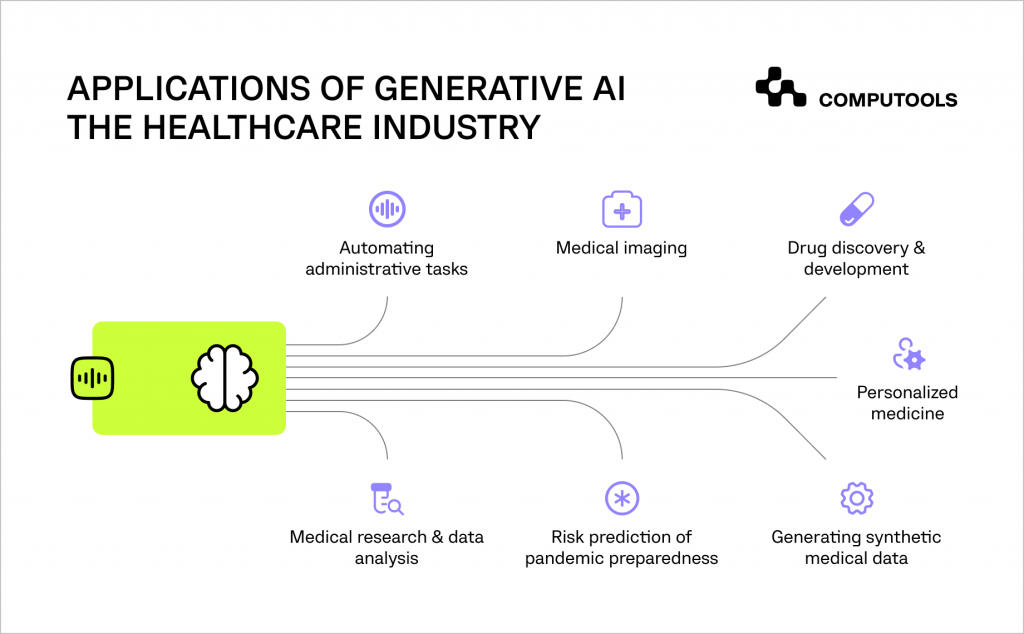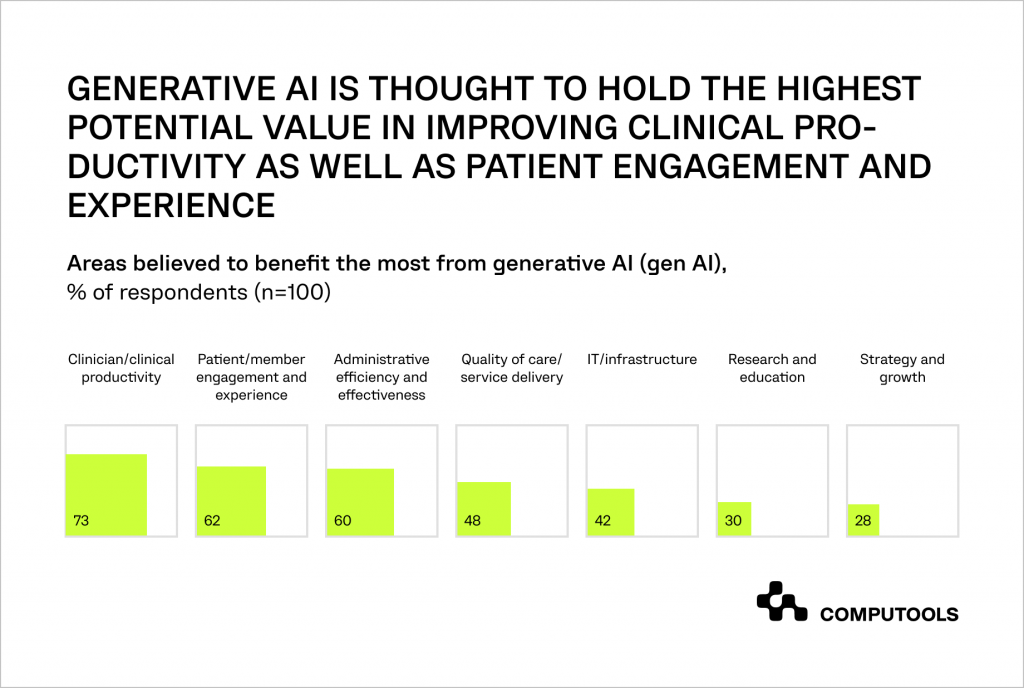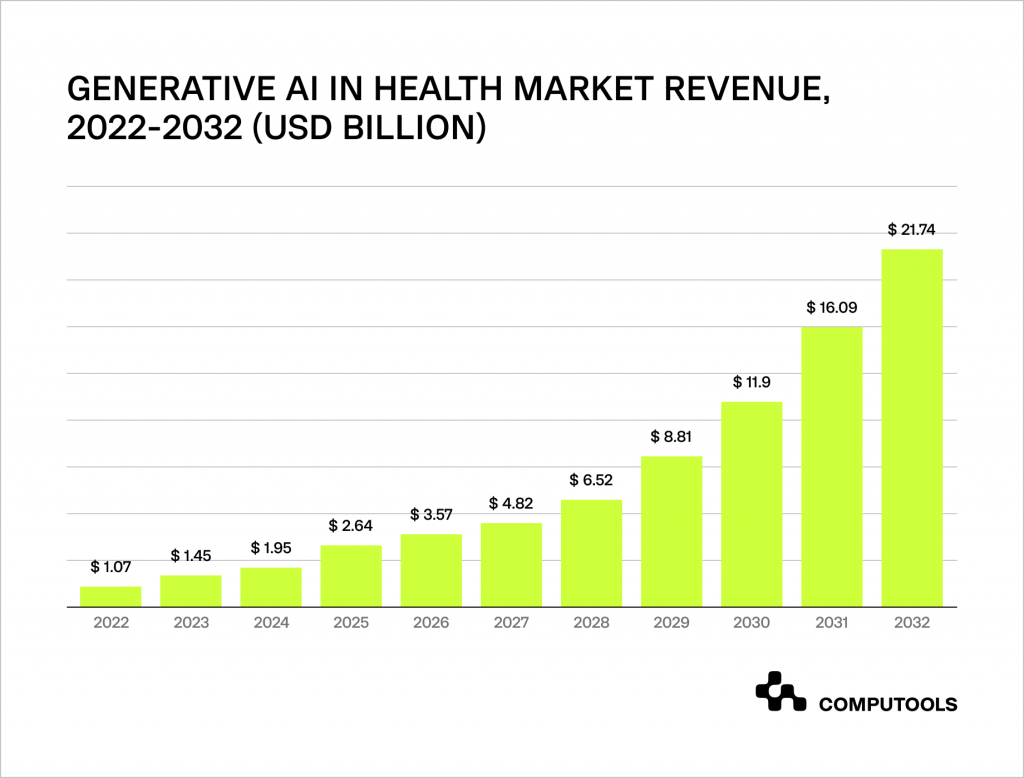The Meaning of Gen AI for Healthcare in 2024
Health systems face several difficulties. The lack of clinical workers is still a major burden. According to McKinsey, there might be a 10–20% shortfall in the number of nurses in the US who can provide direct patient care by 2025.
Health institutions face increased financial strain due to inflation in general and wage rise for nonclinical positions specifically.
Stakeholders pose additional demands on health systems at the same time. Health institutions are being forced, for instance, to provide omnichannel experiences, including digital tools like self-scheduling, as a result of customers’ interactions with merchants.
Payers are pushing health systems to transition to value-based care (VBC) models in the meantime. From 80 million in 2022 to 160 million in 2027, there will be more VBC. Health systems would need to improve their capacity to absorb risk in order to do this.

Gen-AI can change the situation. When companies and governmental organisations speak about AI technology in medicine, they mean that generative AI in medicine can help reduce the strain on healthcare professionals, allowing them to focus on improving patient outcomes.
In our 2024 AI development services already can create solutions that support medical professionals by automating routine tasks, analyzing all the medical data, and enhancing the patient care processes.
The non-traditional players, particularly digital-native companies, are reshaping healthcare by targeting high-margin patient segments and optimizing inpatient care. These well-capitalized entrants are driving down costs and efficiency, intensifying competition for traditional providers.
As a result, health systems face increased pressure to reduce inpatient utilization and reimbursements while adapting to new models of care delivery.
AI Software Engineering is important to advance the growth of applications of generative AI in healthcare. These tools will boost routine operations, save time for personell, and lead to better care for patients.
Global Growth and Impact of Generative AI in Healthcare
Generative AI in healthcare is rapidly expancing, driven by its potential to revolutionize patient care and enhance clinical productivity. It influences several growth points, including improving patient and member engagement, enhancing administrative efficiency, and elevating the quality of care.
Clinicians benefit from analysing vast amounts of patient data, assist in diagnostic processes, and optimize treatment plans. Gen-AI also extends beyond clinical applications and improves overall patient interactions and experiences.

Challenges of AI in Healthcare
Despite the promising potential, there are still some challenges of generative AI for healthcare that need to be addressed. One of the primary AI challenges in healthcare is data privacy and security.
Businesses need to be sure that patient data is protected and used ethically. Integrating AI software solutions in healthcare systems poses operational and technical hurdles.
The technology is also not universally applicable; for example, certain rare conditions or highly individualized treatments may still require traditional, human-driven approaches.

Computools
Software Solutions
Computools is an IT consulting and software engineering company that delivers innovative solutions to help businesses unlock tomorrow. Our clients represent a wide range of industries, including retail, logistics, finance, healthcare, and others.
Current Trends and Future Predictions in Healthcare AI
The generative AI usage in healthcare business is poised for exponential growth, projected to reach USD 21.74 billion by 2032.
With a 35.1% CAGR, this growth is driven by the technology’s potential to revolutionize medical research, accelerate drug discovery, and enhance diagnostic accuracy.
Gen-AI’s integration across various healthcare sectors is becoming a cornerstone for advancements in personalized medicine.

AI implementation is starting to alter the healthcare business in a number of ways.
Here are a few current examples:
• Radiology: AI tools automate diagnosis and picture analysis. This can assist a radiologist in highlighting areas of interest on a scan.
Additionally, there is a chance for entirely automated solutions, which might assist offer fast interpretation in underserved areas or after hours. These systems would read and interpret a scan automatically without human oversight.
Meanwhile, the FDA has already approved an American company’s AI-powered platform for the analysis and interpretation of cardiac MRI data.
• Drug discovery: AI techniques mine enormous databases of data on already available medications to find novel therapeutic candidates.
These drugs may then be modified to combat serious diseases like the Ebola virus. This might speed up the process of bringing new medications to market in response to threats from severe diseases by increasing the effectiveness and success rate of drug development.
• Patient Risk Identification: AI technologies can assist physicians in real-time in identifying patients who are at risk by analyzing large volumes of historical patient data.
Re-admission risks and patients who have a higher likelihood of returning to the hospital within 30 days of release are now key points.
A number of businesses and healthcare systems are creating solutions using information from the patient’s electronic health record; this is partly due to payers’ growing resistance to paying for readmission-related hospital stays.
A patient’s retinal still picture can be used to forecast the patient’s risk of cardiovascular disease, according to other recent research.
• Primary Care: Several organisations are developing voice- or chat-based direct-to-patient systems for triaging and providing guidance.
For straightforward inquiries and health-related concerns, this offers rapid, scalable access.
In addition to lowering the need on primary healthcare professionals by preventing needless trips to the doctor, this might also, for a certain set of problems, give communities in underserved or distant places access to basic advice that they otherwise wouldn’t have.
Real World Examples of Gen AI Usage in Healthcare
Although generative AI faces a number of challenges in healthcare, we can already see its successful application in various fields.
Companies such as Philips, Siemens, and Medtronic are demonstrating the potential of this technology in solving current challenges.
Philips
At the RSNA 2023 conference in Chicago, Philips introduced a suite of AI-enabled healthcare solutions. The BlueSeal MR Mobile system is notable for being the world’s first helium-free mobile MRI, enabling broader access to MRI exams through its mobile 1.5T fully sealed magnet.
Philips HealthSuite Imaging, a cloud-based evolution of Philips Vue PACS, enhances operational efficiency with integrated reporting, AI-enabled workflow orchestration, and rapid remote diagnostic access.
Additionally, the new Philips AI Manager provides radiologists with over 100 AI applications for clinical insights and workflow improvement.
These innovations underscore Philips’ commitment to leveraging generative AI use cases to optimize diagnostic workflows, improve patient outcomes, and maximise customer value.
Siemens
Siemens Healthineers shows us the potential of generative AI in healthcare projects, too. As the first company to combine clinical images with reports using generative AI, Siemens Healthineers is pioneering innovations.
Their generative AI technology links medical images with corresponding report sections, allowing clinicians to highlight specific areas in reports by interacting with the images and vice versa.
This capability streamlines the diagnostic process by dynamically generating and prioritizing reports on diagnostic images based on their importance.
Moreover, Siemens Healthineers is expanding the use of generative AI beyond imaging and reporting. They are exploring applications in customer service, support, and medical staff training, making generative AI a vital component of their “Smart Imaging Value Chain.”
This approach integrates intelligent data management across the entire imaging process, from patient history to reporting.
GE HealthCare and AWS
GE HealthCare has partnered with Amazon Web Services to create generative AI models and tools that will help analyze complex medical data more efficiently.
GE HealthCare is mainly known for its medical imaging, ultrasound, and diagnostic solutions, believes generative AI can help clinicians better utilize this data in screenings, diagnoses, and operational workflows.
GE HealthCare wants AWS’s technological infrastructure, including tools like Amazon Bedrock and Amazon SageMaker, to build AI models at scale. The tools will assist hospitals and clinicians in making the most of their data, improving decision-making, and streamlining workflows like scheduling.
The impact of AI in healthcare extends beyond clinical application. The partners plan to use Amazon Q Developer and generate real-time code suggestions for software developers.
Medtronic
Medtronic’s AI-enhanced portfolio already features devices that leverage AI for clinical decision support, creating new indications, and delivering personalized treatments.
The company is optimistic about the growth potential of AI in the med tech sector and is also optimizing its supply chain and reducing costs through automation.
They emphasize that while it is still early in the process, Medtronic is seeing promising results from training AI models with its high-quality data.
The company plans to continue collaborating with regulators, including the FDA, to ensure the safe and effective deployment of AI technologies across multiple disease areas and healthcare systems, positioning Medtronic as a leader in AI adoption.
Dental Health
Dental Health is a company that has over 20 years of experience. It operates in the Middle Eastern dental industry.
The company collaborated with Computools, because their platform needed to be modernised. As it specialises in providing advanced tools and technologies for dental and orthodontic practitioners, they wanted to renovate their solutions. Their app architecture was outdated and monolithic.
Computools offered to upgrade the platform to a modern tech stack, optimizing X-ray processing algorithms, and integrating artificial intelligence to automate routine tasks.
The team implemented new features, like image processing, analytical report generation, and support for multiple languages. It was decided to migrate to a microservices-based architecture.
The platform’s modernization has boosted diagnostic accuracy, patient outcomes, and productivity for dental practitioners.
Choosing Your Digital Partner
The impact of generative AI in healthcare extends beyond the efficiencies showcased in the real-world examples.
Looking ahead, generative AI has the potential to revolutionize areas like drug discovery and personalized medicine. Imagine AI systems that can rapidly analyze vast datasets to identify new treatment options or tailor therapy plans to individual patients’ genetic profiles.
While challenges like data privacy and integration remain, the examples presented illustrate how generative AI is already being developed responsibly.
Choosing the right digital partner for healthcare business is paramount in advancing healthcare Software Engineering and Healthtech Software Engineering initiatives.
A suitable Software Engineering provider possesses the expertise to tailor solutions that meet specific healthcare challenges while ensuring compliance with industry regulations.
Collaborative partnerships can significantly enhance operational efficiency and improve service delivery, paving the way for the successful integration of digital technologies within established healthcare practices.
For more inquiries regarding Software Engineering, reach out to Computools for comprehensive solutions at info@computools.com. If you are looking for high-quality healthcare Software Engineering, please get in touch today.









“Computools was selected through an RFP process. They were shortlisted and selected from between 5 other suppliers. Computools has worked thoroughly and timely to solve all security issues and launch as agreed. Their expertise is impressive.”